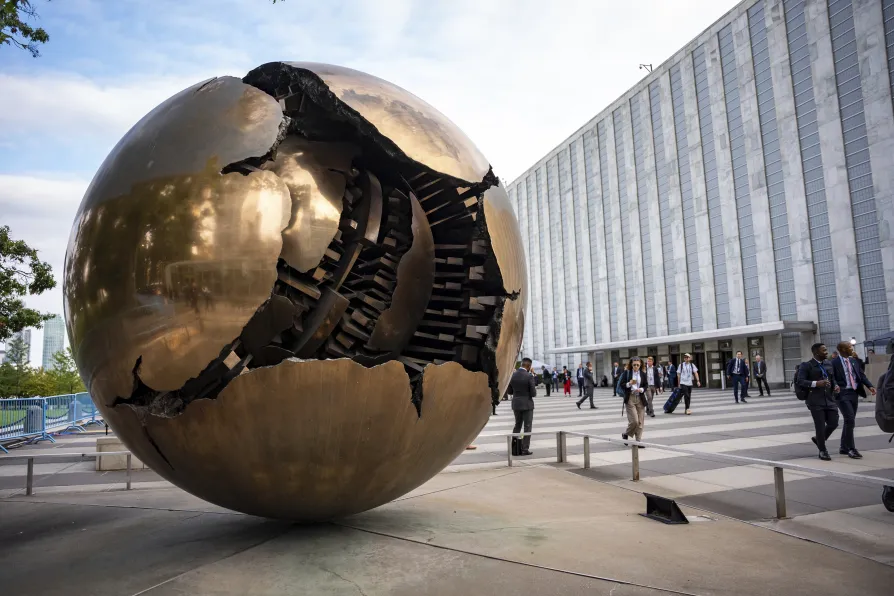Does widespread and uncontrolled use of AI change our relationship with scientific meaning? Or with each other? ask ROX MIDDLETON, LIAM SHAW and MIRIAM GAUNTLETT
ZHANG HE highlights pressure coming from the global South for a more multilateral approach to global governance and a more equitable world order

 People walk around the plaza by the Sphere Within Sphere outside the United Nations Headquarters on the first day of the 80th session of the UN General Assembly's High-Level week, September 22, 2025
People walk around the plaza by the Sphere Within Sphere outside the United Nations Headquarters on the first day of the 80th session of the UN General Assembly's High-Level week, September 22, 2025
EIGHTY years ago, in the aftermath of the devastating world wars, nations united to create the United Nations, opening a new chapter in global governance.
Since then, the UN has reached key milestones in promoting international co-operation and addressing global challenges. However, today it faces growing challenges as powerful nations prioritise unilateral actions over collective decision-making. The shift towards unilateralism is eroding the once-co-operative global governance system.
China and the United States are the world’s largest economies, making up over 40 per cent of global economic output. The differences in their governance philosophies has a significant impact on the direction and practices of global governance.
The United States emphasises a “rules-based international order” that primarily serves its own interests. The “America First” policy focuses on prioritising national interests in international affairs, aiming to secure its absolute dominance in the global system through unilateral actions and protectionist measures.
US trade wars with other nations have significantly disrupted global economic co-operation through imposing tariffs and trade barriers, making it more difficult to achieve co-ordinated responses to global challenges such as climate change and technological innovation.
China, by contrast, champions a more balanced and co-operative international order, grounded in the principles of sovereign equality and multilateralism.
At the SCO Tianjin Summit, Chinese President Xi Jinping proposed the Global Governance Initiative, calling for a fairer, more equitable governance framework and advancing the vision of a community with a shared future for humanity.
China has also reaffirmed its commitment to safeguarding the UN-centred international system and upholding an international order based on international law.
There is an increasing demand for global governance reform, particularly from Brazil and other developing countries, who seek to amplify the voice of the global South in key international institutions like the UN.
They believe that the current global governance structure, which is largely led by Western developed nations, contains many unjust rules. Under the leadership of President Luiz Inacio Lula da Silva, Brazil has made this issue a priority, using its 2025 Brics presidency to push for change. During the Brics Summit in Rio de Janeiro, Lula emphasised that the group has the “necessary legitimacy to lead the reform of the multilateral system.”
The current global governance mechanisms are in urgent need of reform. While it may take time for the United Nations and other international institutions to effectively respond to these challenges, the immediate priority is clear: uniting against unilateralism.
Unilateral actions have long obstructed global co-operation and hindered the resolution of critical international challenges. Only through unity can the international community advance toward a more just and equitable order, one in which all nations, regardless of size or strength, play a meaningful role in shaping solutions to shared challenges.

The colonial mindset behind the governance of the UN is the reason for its inertia when it comes to conflict resolution, argues ROGER McKENZIE – but can China’s Global Governance Initiative point in a new direction of global equality?












